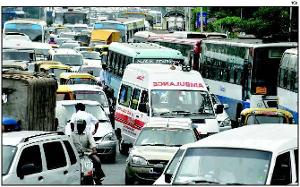Gurgaon, Sep 6: Patients visiting the two government hospitals in Gurgaon on Saturday were in for a rude surprise, after they found that two of the three mobile ICUs had been sent to Faridabad for the Prime Minister's rally on Sunday.
 Patients said they were forced to wait for hours for ambulances, and eventually had to hire or borrow cars to reach the hospitals.
Patients said they were forced to wait for hours for ambulances, and eventually had to hire or borrow cars to reach the hospitals.
A team of six doctors, including two anesthetists, two orthopedists and two surgeons, have also been sent to Faridabad. "I am worried as we will be left with only one orthopedist and two surgeons in the district. Even though it is a Sunday, surgeons and anesthetists are often needed in the emergency ward. If more emergency cases come up on Sunday, surgeries might have to be postponed," said a doctor at the Civil Hospital, requesting anonymity.
While the ambulances were sent on Friday, the team of doctors will leave on Sunday morning. There is already a shortage of ambulances in the city as nine out of 20 ambulances have been lying defunct for the past one month. Two out of the three mobile ICUs, included among the 20 ambulances, have also been sent.
The total number of ambulances sent to the rally from across the district is 14, doctors said. These include two mobile ICUs from Gurgaon, two each from Palwal, Mewat and Rewari and two from private hospitals in Gurgaon. The remaining four are from the Civil Hospital in Faridabad. "We have 13 ambulances in Faridabad, of which four have been sent to the rally," said a doctor at Badshah Khan Civil Hospital.
While four ICU ambulances will be reserved solely for the PM, six will be parked at different spots across the rally grounds. Four will be reserved for VVIPs. There will also be a treatment centre set up at the venue by a private hospital, along with a safe house.
Chief medical officer (CMO) Pushpa Bishnoi said, "I don't think there will be any issue, as we have other ambulances. We will easily manage for a couple of days."





Comments
Add new comment